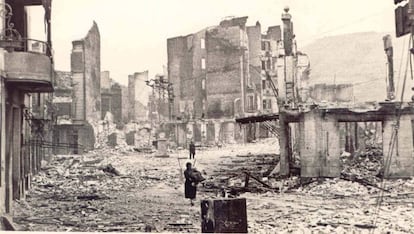Spain to grant ‘place of memory’ status to Basque town of Gernika over Nazi bombing
The location was the target of one of the first indiscriminate air raids against a civilian population. The attack by the Condor Legion inspired Picasso’s most famous work

The entire urban space of Gernika-Lumo, in Spain’s northern Basque region, will be considered a “place of memory.” The Spanish government, which had originally meant to grant this status to one landmark building, has decided to expand it to the entire municipality, known worldwide for having been bombed in 1937 by the German Luftwaffe’s Condor Legion — the air force that Hitler sent his ally, Francisco Franco, to help the Nationalist rebels take power during the Spanish Civil War. The attack was famously depicted by Pablo Picasso in his giant painting Guernica. The move had been requested by local and provincial leaders, the University of the Basque Country, and human rights groups.
In its decision, the government noted that “the town is known internationally” for being the target of “one of the first indiscriminate bombings against a civilian population in the world, configuring itself as a testing ground for what would later be put into practice in World War II.” Nazi aviation attacked Gernika (in its Basque spelling, or Guernica in Spanish) in support of Franco’s forces on April 26, 1937. The city lacked anti-aircraft defenses. “It was destroyed in three hours of incessant bombardment,” as Paul Preston recalled in his biography of Franco. The number of victims, he added, “will never be known with certainty.”
The regional government of the Basque Country estimated that 1,645 people died and another 889 were injured. The Gernika Assembly House withstood the attack, surprisingly, and the building is currently the headquarters of the Juntas Generales de Bizkaia, the provincial authority. Picasso’s Guernica was commissioned by the government of Spain’s Second Republic and showcased at the 1937 International Exhibition in Paris, becoming an international symbol of the horrors of war.
On April 26, Minister of the Presidency Félix Bolaños participated in an event that the city of Gernika holds each year on the anniversary of the bombing. The day before, in the Senate, Spain’s Prime Minister Pedro Sánchez, of the Socialist Party (PSOE), had announced the declaration of Gernika as a place of memory. “I am proud to be here, also representing the legitimate government that at that time was attacked by indiscriminate bombardment by the Nazis and fascists. Spanish democracy today is the result of that struggle.”
The declaration of “places of memory” is one of the tools included in the Democratic Memory Law, approved by parliament in October of last year, to mark spaces of special historical relevance linked to the fight for freedom. The government can decree them by law, open administrative procedures and review requests initiated by civil society groups.
Sign up for our weekly newsletter to get more English-language news coverage from EL PAÍS USA Edition
Tu suscripción se está usando en otro dispositivo
¿Quieres añadir otro usuario a tu suscripción?
Si continúas leyendo en este dispositivo, no se podrá leer en el otro.
FlechaTu suscripción se está usando en otro dispositivo y solo puedes acceder a EL PAÍS desde un dispositivo a la vez.
Si quieres compartir tu cuenta, cambia tu suscripción a la modalidad Premium, así podrás añadir otro usuario. Cada uno accederá con su propia cuenta de email, lo que os permitirá personalizar vuestra experiencia en EL PAÍS.
¿Tienes una suscripción de empresa? Accede aquí para contratar más cuentas.
En el caso de no saber quién está usando tu cuenta, te recomendamos cambiar tu contraseña aquí.
Si decides continuar compartiendo tu cuenta, este mensaje se mostrará en tu dispositivo y en el de la otra persona que está usando tu cuenta de forma indefinida, afectando a tu experiencia de lectura. Puedes consultar aquí los términos y condiciones de la suscripción digital.








































